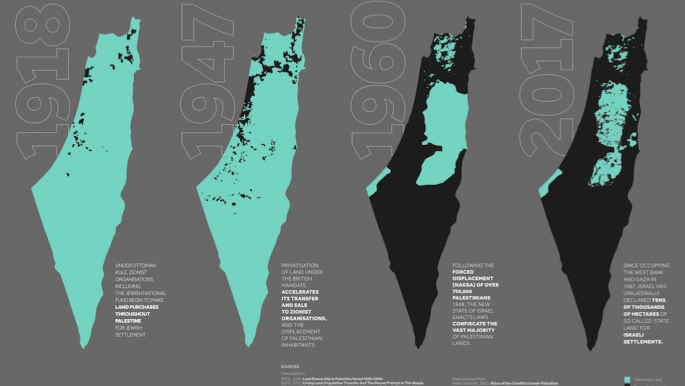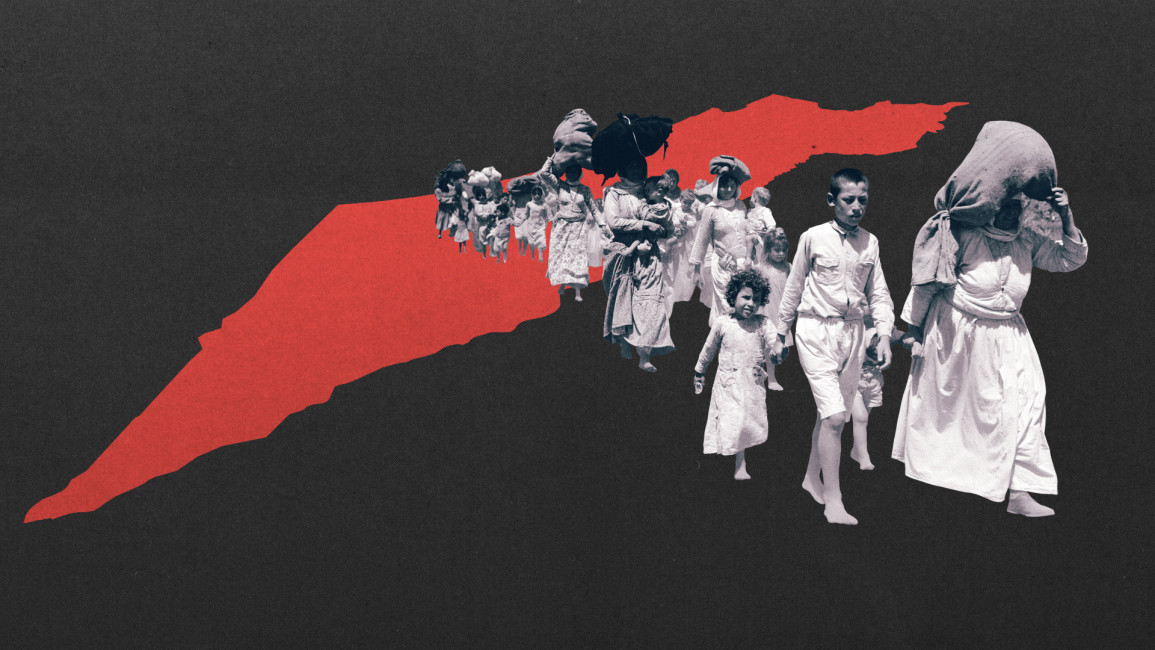
Erasing the Palestinian refugees: Trump, UNRWA and the Nakba at 72
Seventy-two years ago, in May 1948, over 750,000 Palestinians were expelled or forced to flee from their homes when Israel was established.
Today there are currently more than 5.6 million Palestinian refugees, those born in Palestine and their descendants. The majority live in harsh conditions in overcrowded camps run by the United Nations Relief and Works Agency (UNRWA), the agency responsible for Palestinian refugees.
Over seven decades, the situation of the Palestinian refugees and UNRWA have become inseparable. With the Covid-19 pandemic, the global economic recession, and UNRWA's weak financial position, the agency and the Palestinian refugees it serves face another catastrophe.
On 1 May 1950, UNRWA began providing health, education and relief services to Palestinian refugees in Lebanon, Jordan, Syria, Gaza and the West Bank. Last December, UNRWA's mandate was extended until 2023 over Washington's objections. However, its position has never been weaker.
UNRWA has faced a declining budget for years and this situation was exacerbated by the Trump administration's decision to end US funding for the agency. Since the agency was created, the United States has been its largest donor and provided $6.15 billion over 67 years. By 2018, Washington donated $360 million annually to UNRWA. After the cuts, however, UNRWA faced a historic deficit that severely weakened its services and programmes.
 |
Washington's antagonism towards UNRWA and the Palestinian refugees did not begin with the Trump administration |  |
Washington's antagonism towards UNRWA and the Palestinian refugees did not begin with the Trump administration. Indeed, it is part of the broader alignment between the United States and Israel that seeks to deny Palestinians their rights dating back to the Nakba. Yet the refugees are the key to any resolution between Israel and the Palestinians.
In late 1948, the UN General Assembly adopted Resolution No. 194, which stipulated that any refugees wishing to return to their homes should be allowed to do so and receive compensation for any losses. But Israel has actively worked to prevent their return of the Palestinian refugees in several ways.
Since 1950, Israeli law has prevented the return of Palestinian refugees. This has been coupled with intransigence in negotiations on the refugee issue. Israel has also undermined UNRWA and sought the agency's elimination in order to erase the refugees.
Seven years ago, the American Israel Public Affairs Committee (AIPAC), the influential pro-Israel lobbying organisation in the United States attempted to work with allies in the US Congress to force UNRWA to redefine "refugees".
 |
|
| [Click to enlarge] |
Like other UN agencies, UNRWA defines refugees as those individuals that were displaced in 1948 as well as their descendants. AIPAC's goal was to dramatically reduce the number of Palestinian refugees served by the agency. Although the attempt failed, Israel and its supporters in the United States did not abandon their targeting of UNRWA or the Palestinian refugees.
Last May, Jason Greenblatt, then White House envoy on Middle East peace, criticised UNRWA. Without acknowledging the impact of Washington's funding cuts, he stated that "the UNRWA model has had its time. It is in permanent crisis mode... an irredeemably flawed funding model. Currently running on fumes. What happens when UNRWA's bank account is empty again? UNRWA is a band aid." Greenblatt's assertions signaled the Trump administration's plans to further deny Palestinian rights.
Trump's "Vision for Peace," released earlier this year, dismantles the legal status of Palestinian refugees. It ends all claims related to the return of Palestinian refugees to their homes, as well as Israel's obligations under international law to facilitate their return and absorption.
 |
Israel has also undermined UNRWA and sought the agency's elimination in order to erase the refugees |  |
Drawing on previous agreements between the United States and Israel, the Trump plan states that the refugees will be absorbed into the Palestinian state. The vast majority will be integrated into their host countries. In addition, 50,000 refugees will be resettled in countries belonging to the Organization of Islamic Cooperation (OIC) over a 10-year period.
The Trump plan blamed the Arab states and UNRWA for perpetuating the refugee issue. "UNRWA's mandate, and its multi-generational definition of who constitutes a refugee, has exacerbated the refugee crisis," the plan stated. Although it outlined a compensation fund for the refugees, the plan warned that the previous proposals that "promise tens of billions of dollars in compensation for the refugees have never been realistic and a credible funding source has never been identified."
Read more: UK should punish Israel annexation with 'economic sanctions', says House of Lords
Instead, it promised to "endeavour to raise a fund to provide some compensation to Palestinian refugees." The trust fund would be jointly administered by the State of Palestine and the United States.
While the plan claims that the final goal is to replace refugee status and camps as well as UNRWA with citizenship, housing units, and an effective government, this is undermined by the Trump administration's hostility toward the Palestinians. Instead, erasing the refugees appears to be the ultimate goal.
Although they have rejected the Trump plan, Palestinian negotiators have facilitated the abandonment of refugee rights. The "Palestine Papers" revealed that the Palestinian leadership and negotiating team settled for a symbolic return of refugees in their proposals. In a 21 October 2009 meeting with then US Special Envoy George Mitchell, Chief Palestinian negotiator Saeb Erakat said, "Palestinians will need to know that five million refugees will not go back." This was also reflected in public statements made by Palestinian President Mahmoud Abbas. Yet even this symbolic number is too high for Israel and the United States.
 |
It will not be possible to reach a just solution to the Palestinian refugee issue until Israel and the United States respect their right of return |  |
Seventy-two years after the Nakba, Israel and the United States continue to deny the right of Palestinian refugees to return to their homes. They also are coordinating to ensure that UNRWA is unable to provide the necessary services and programmes to ensure their basic livelihoods and subsistence.
Moreover, as evidenced in the Trump plan and Israeli Prime Minister Benjamin Netanyahu's plans to annex parts of the occupied West Bank, they have no intention of allowing the creation of a sovereign, independent Palestinian state.
Despite the concessions by the Palestinian leadership, it will not be possible to reach a just solution to the Palestinian refugee issue until Israel and the United States respect their right of return. In addition, UNRWA must have the appropriate funding to meet its mandate, especially in the middle of a global pandemic.
Finally, countries hosting Palestinian refugees, specifically Lebanon, where they suffer from discrimination and violations of their basic rights, must repeal their discriminatory laws. Otherwise, the wounds of the Nakba will remain unhealed.
Dalal Yassine is a Program and Policy Advisor with Al-Shabaka, The Palestinian Policy Network. She is an expert in human rights, refugee rights, and gender equality.
Follow her on Twitter: @Dalal_yassine
Opinions expressed in this article remain those of the author and do not necessarily represent those of The New Arab, its editorial board or staff.




